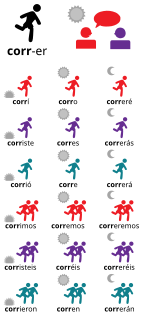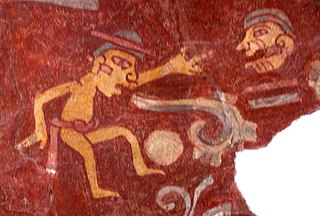| Look up gender in Wiktionary, the free dictionary. |
Gender is the range of characteristics pertaining to, and differentiating between, masculinity and femininity.
Contents
Gender or Genders may also refer to:
| Look up gender in Wiktionary, the free dictionary. |
Gender is the range of characteristics pertaining to, and differentiating between, masculinity and femininity.
Gender or Genders may also refer to:
| This disambiguation page lists articles associated with the title Gender. If an internal link led you here, you may wish to change the link to point directly to the intended article. |
In linguistics, declension is the changing of the form of a word, generally to express its syntactic function in the sentence, by way of some inflection. The inflectional change of verbs is called conjugation.

In linguistics, conjugation is the creation of derived forms of a verb from its principal parts by inflection. Verbs may inflect for grammatical categories such as person, number, gender, tense, aspect, mood, voice, case, possession, definiteness, politeness, causativity, clusivity, interrogativity, transitivity, valency, polarity, telicity, volition, mirativity, evidentiality, animacy, associativity, pluractionality, and reciprocity. Verbs may also be affected by agreement, polypersonal agreement, incorporation, noun class, noun classifiers, and verb classifiers. Agglutinative and polysynthetic languages tend to have the most complex conjugations albeit some fusional languages such as Archi can also have extremely complex conjugation. Typically the principal parts are the root and/or several modifications of it (stems). All the different forms of the same verb constitute a lexeme, and the canonical form of the verb that is conventionally used to represent that lexeme is called a lemma.
In linguistics, grammatical gender is a specific form of noun class system in which the division of noun classes forms an agreement system with another aspect of the language, such as adjectives, articles, pronouns, or verbs. This system is used in approximately one quarter of the world's languages. In these languages, most or all nouns inherently carry one value of the grammatical category called gender; the values present in a given language are called the genders of that language. According to one definition: "Genders are classes of nouns reflected in the behaviour of associated words."

A language is a structured system of communication. Language, in a broader sense, is the method of communication that involves the use of – particularly human – languages.
In linguistics, a noun class is a particular category of nouns. A noun may belong to a given class because of the characteristic features of its referent, such as gender, animacy, shape, but such designations are often clearly conventional. Some authors use the term "grammatical gender" as a synonym of "noun class", but others consider these different concepts. Noun classes should not be confused with noun classifiers.
In linguistics and grammar, a pronoun is a word that substitutes for a noun or noun phrase. It is a particular case of a pro-form.
Identification or identify may refer to:
Operator may refer to:
Kisuba, also known as Olusuba, is a Bantu language spoken by the Suba people of Kenya. The language features an extensive noun-classification system using prefixes that address gender and number. Suba clans are located on the eastern shore and islands of Lake Victoria in Kenya and Tanzania. They have formed alliances with neighboring clans, such as the Luo people, via intermarriages, and as a result a majority of Suba people are bilingual in Dholuo. The Suba religion has an ancient polytheistic history that includes writings of diverse, ancestral spirits. A recent revival of the Suba language and its culture has influenced the increasing number of native speakers each year.

Munsee is an endangered language of the Eastern Algonquian subgroup of the Algonquian language family, itself a branch of the Algic language family. Munsee is one of the two Delaware languages. It is very closely related to the Unami Delaware, but the two are sufficiently different that they are considered separate languages. Munsee was spoken aboriginally in the vicinity of the modern New York City area in the United States, including western Long Island, Manhattan Island, Staten Island, as well as adjacent areas on the mainland: southeastern New York State, the northern third of New Jersey, and northeastern Pennsylvania.

The Arapesh languages are several closely related Torricelli languages of the 32,000 Arapesh people of Papua New Guinea. They are spoken in eastern Sandaun Province and northern East Sepik Province, Papua New Guinea.

The Sepik or Sepik River languages are a family of some 50 Papuan languages spoken in the Sepik river basin of northern Papua New Guinea, proposed by Donald Laycock in 1965 in a somewhat more limited form than presented here. They tend to have simple phonologies, with few consonants or vowels and usually no tones.
Paumarí is an Arauan language spoken in Brazil by about 300 older adults out of an ethnic population of 900. It is spoken by the Paumari Indians, who call their language “Pamoari”. The word “Pamoari” has several different meanings in the Paumarí language: ‘man,’ ‘people,’ ‘human being,’ and ‘client.’ These multiple meanings stem from their different relationships with outsiders; presumably it means ‘human being’ when they refer to themselves to someone of ostensibly equal status, and ‘client’ when referring to their people among river traders and Portuguese speakers.
Kiga is a Great Lakes Bantu language of the Kiga people (Bakiga). Kiga is a similar and partially mutually intelligible with Nkore language. It was first written in the second half of the 19th century.
Anindilyakwa is an Australian Aboriginal language spoken by the Warnindhilyagwa people on Groote Eylandt in the Gulf of Carpentaria in the Northern Territory of Australia. A 2001 Australian government study identified more than 1000 speakers of the language, although there are reports of as many as three thousand. In the 2016 census, around 1500 people said they spoke Anindilyakwa.
In linguistics, the term nominal refers to a category used to group together nouns and adjectives based on shared properties. The motivation for nominal grouping is that in many languages nouns and adjectives share a number of morphological and syntactic properties. The systems used in such languages to show agreement can be classified broadly as gender systems, noun class systems or case marking, classifier systems, and mixed systems. Typically an affix related to the noun appears attached to the other parts of speech within a sentence to create agreement. Such morphological agreement usually occurs in parts within the noun phrase, such as determiners and adjectives. Languages with overt nominal agreement vary in how and to what extent agreement is required.
F is the sixth letter of the Latin alphabet.

In linguistic morphology, inflection is a process of word formation, in which a word is modified to express different grammatical categories such as tense, case, voice, aspect, person, number, gender, mood, animacy, and definiteness. The inflection of verbs is called conjugation, and one can refer to the inflection of nouns, adjectives, adverbs, pronouns, determiners, participles, prepositions and postpositions, numerals, articles etc., as declension.
The Kwasio language, also known as Ngumba / Mvumbo, Bujeba, and Gyele / Kola, is a language of Cameroon, spoken in the south along the coast and at the border with Equatorial Guinea by some 70,000 members of the Ngumba, Kwasio, Gyele and Mabi peoples. Many authors view Kwasio and the Gyele/Kola language as distinct. In the Ethnologue, the languages therefore receive different codes: Kwasio has the ISO 639-3 code nmg, while Gyele has the code gyi. The Kwasio, Ngumba, and Mabi are village farmers; the Gyele are nomadic Pygmy hunter-gatherers living in the rain forest.
Penelope "Penny" Eckert is a professor of linguistics at Stanford University in Stanford, California, where she holds the position of "Albert Ray Lang Professor of Linguistics". She is a prominent scholar of variationist sociolinguistics and is the author of several scholarly works on language and gender. She served as the President of the Linguistic Society of America in 2018.